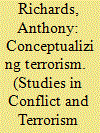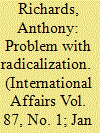| Srl | Item |
| 1 |
ID:
132196


|
|
|
|
|
| Publication |
2014.
|
| Summary/Abstract |
This article argues that, while there have always been good reasons for striving for a universally agreed definition of terrorism, there are further reasons for doing so in the post 9/11 environment, notwithstanding the formidable challenges that confront such an endeavour. Arguing that the essence of terrorism lies in its intent to generate a psychological impact beyond the immediate victims, it will propose three preliminary assumptions: that there is no such thing as an act of violence that is in and of itself inherently terrorist, that terrorism is best conceptualized as a particular method of political violence rather than defined as inherent to any particular ideology or perpetrator, and that non-civilians and combatants can also be victims of terrorism. It will then outline the implications that these assumptions have for the definitional debate.
|
|
|
|
|
|
|
|
|
|
|
|
|
|
|
|
| 2 |
ID:
138352


|
|
|
|
|
| Summary/Abstract |
This article argues that there has been an increasing convergence of the discourses of terrorism, radicalization and, more lately, extremism in the UK and that this has caused counterterrorism to lose its focus. This is particularly evident in the counterterrorism emphasis on non-violent but extremist ideology that is said to be ‘conducive’ to terrorism. Yet, terrorism is ineluctably about violence or the threat of violence; hence, if a non-violent ideology is in and of itself culpable for terrorism in some way then it ceases to be non-violent. The article argues that there should be a clearer distinction made between (non-violent) extremism of thought and extremism of method because it is surely violence and the threat of violence (integral to terrorism) that should be the focus of counterterrorism. The concern is that counterterrorism has gone beyond its remit of countering terrorism and has ventured into the broader realm of tackling ideological threats to the state.
|
|
|
|
|
|
|
|
|
|
|
|
|
|
|
|
| 3 |
ID:
102665


|
|
|
|
|
| Publication |
2011.
|
| Summary/Abstract |
This article questions the utility of the term 'radicalization' as a focus for counter-terrorism response in the UK. It argues that the lack of clarity as to who the radicalized are has helped to facilitate a 'Prevent' strand of counterterrorism strategy that has confusingly oscillated between tackling violent extremism, in particular, to promoting community cohesion and 'shared values' more broadly. The article suggests that the focus of counterterrorism strategy should be on countering terrorism and not on the broader remit implied by wider conceptions of radical-ization. This is not to diminish the importance of contextual or 'root cause' factors behind terrorism, but, if it is terrorism that is to be understood and countered, then such factors should be viewed within the terrorism-counterterrorism discourse and not a radicalization-counter-radicalization one. The article goes on to consider the characterization of those presenting a terrorist threat to the UK as being 'vulnerable' to violent extremism. While it argues that the notion of vulnerable individuals and communities also lends itself to a wider 'Prevent' remit, it cautions that the impetus towards viewing terrorism as the product of vulnerability should not deflect us from what has generally been agreed in terrorism studies-that terrorism involves the perpetration of rational and calculated acts of violence.
|
|
|
|
|
|
|
|
|
|
|
|
|
|
|
|
| 4 |
ID:
021732


|
|
|
|
|
| Publication |
2001.
|
| Description |
72-89
|
|
|
|
|
|
|
|
|
|
|
|
|
|
|
|